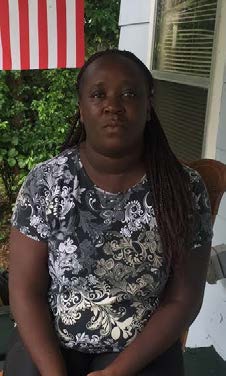
DRF makes provision for disabled to vote

Dianna Shepeard is now a leading advocate for people with disabilities to go to the polls and vote.
Photo by Ashley Williams
By Ashley Williams
Outlook Writer
Ever since being diagnosed with Post Traumatic Stress Disorder in 2005, Dianna Shepeard has had a fear of being in a group. Noise can also be disturbing for the woman who served 16 years in the Navy.
But for this election Shepeard will be stepping out to make her way to the voting poll. It took some doing, but Shepeard said she’d always feels compelled to fulfill her civic duty.
“Just because we have a disability doesn’t mean we can’t go to vote,” Shepeard said. “Our votes are important.”
This past Tuesday, Disability Rights Florida (DRF) announced at a conference that it’s stepping up its awareness efforts to let people with disabilities know they have right to vote as anyone else. Its services are outlined on its website (http://www.disabilityrightsflorida.org).
Shepeard, who now works for the Leon County Supervisor as a clerk, was right there taking it all in at Tuesday’s press conference. She said she skipped the 2012 elections, but has since been meeting with a counselor to help her overcome her fears.
“Being disabled is a lifestyle,” said Shepeard, who also suffers with manic depression. “We can’t change it. This is something I feel strongly about. We never had (resources) to tell us or teach us how to vote. A lot of people with disability began to feel they didn’t have a right. They cannot vote.”
Dana Farmer, director of public policy for DRF, said that people with disabilities shouldn’t worry about getting to the polls. The agency is helping them with voting by mail or doing so early, she said.
“We are a state wide organization and some counties are better than others when it comes to educating the community,” said Natalie Alden, a former member of Duval election advisory panel, “That’s why DRF educates every chance possible, whether in person or through the website.”
In addition to having a website chuck full of information for the disables, some cities also stage mock elections, said Alden.
Shepeard said people with disabilities should seek out help, as she did when she decided to work with her counselor Kelly Harris.
“She told me if I wanted to be normal I needed to get out and socialize with normal people,” she said.
Making the polls accessible to people with disabilities means doing more than providing ramps, Farmer said. On election day, blind voters will be able to vote with ballot in Braille.
Getting out to vote as a disabled person might not be easy, but it’s worth trying to get out, Shepeard said.
“Going to the polls was something I did not do,” she said. “Going out of my house is something I did not do. It’s hard but (people) treat you like family.”







